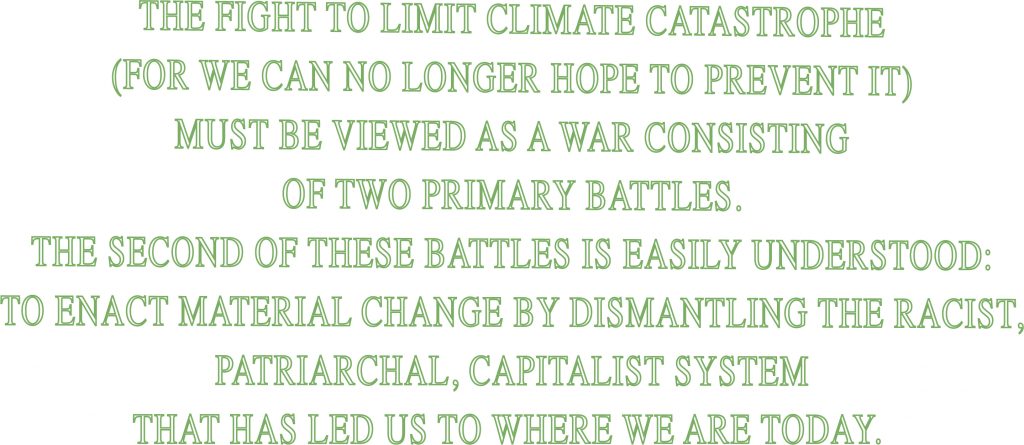Long gone are the days when the climate apocalypse could be denied by sceptical, empirical observers. A week after scorching temperatures burned southern England, from where I write, the tears of mother nature fell with such ferocity that the streets of London were flooded, not to mention the horrific loss of life in Germany. The beginning of last year saw hellish forest fires ravage Australia: today, we see similar scenes in Greece. Europe has begun to feel the sting of climate change, but in truth, its citizens are lucky. For many people in the Global South, the devastating floods, famines, and droughts have already begun in earnest, and swathes of the Middle East are fast becoming uninhabitable for humans. There is no question that the Anthropocene is already here, and that time is rapidly running out for human civilisation on this earth.
One might point to the ever-growing emphasis on climate change in mainstream media discourse as evidence of a turning tide, as proof that our leadership is beginning to take the prospect of climate apocalypse seriously. But that would be a mistake: in truth, what we are witnessing is a performative, spectacular environmentalism. In 1967’s La société du spectacle, Parisian Situationist Guy Debord observed a ‘general shift’ in capitalism ‘from having to appearing,’ with the prestige and purpose of the former ultimately now deriving from latter. The spectacle infests both the public and private spheres and dazzles us into an existence based on images rather than reality. This leaves us ill-equipped to face the challenges of the Anthropocene age.

But before this can happen, we must defeat the spectacle. For while this battle remains unfought, we in the West will find ourselves marching gleefully towards ruin, having contented ourselves with some supposed moral authority derived from putting unrinsed dishes in a dishwasher.
The dishwasher example, suggested by Downing Street spokeswoman Allegra Stratton, was widely mocked, but it reflects an extremely dangerous broader trend of treating the fight for climate justice as one of individualised action and personal responsibility. Based on the data, this is nonsensical. But, as Mark Fisher explains in Capitalist Realism, ‘the cause of eco-catastrophe is an impersonal structure which[…] is precisely not a subject capable of exercising responsibility,’ and the shield of this structure is the illusion of the spectacle. Only when the illusion falls, and most people understand the notion of a ‘personal carbon footprint’ to be a propaganda triumph for the fossil fuel industry, can we truly take on the forces that are destroying our world.
Leaving aside the pitifully inadequate half-measures aimed at limiting CO₂2emissions in international agreements over the last fifty years, the Biden presidency offers a contemporary example of speculative environmentalism in the public sphere. It is widely agreed that Biden’s administration is the greenest ever, which demonstrates how much trouble we are truly in. Since his inauguration, he has appointed fossil fuel lobbyists as advisors, and the oil and gas industry has seen huge gains on the stock market, with the Oil & Gas Exploration & Production Index rising by 35%. It isn’t that this is a cerebral choice: it is a system and spectacle behaving as they should. If the Oval Office were occupied by a genuine climate advocate, then, logically, the president might consider defunding or abolishing the US military, as the Pentagon is earth’s single biggest institutional polluter. But relinquishing the empire is an unfathomable prospect to global capital, and the relative decline of American power and growing Sinophobia among its ruling class and media suggest there is every chance of this situation worsening through a cold-war style military build-up. In place of the fundamental, systemic, and anti-imperialist change that we require, the spectacle serves us totemic, meaningless reform.
Extinction Rebellion presents another example of the spectacle. An outwardly radical single-issue group, XR appears to be the direct-action vanguard of the climate movement in Europe. Unfortunately, the image, in true Debordian fashion, does not match the reality. Scratch beneath protestations of ‘power to the people,’ and you discover that XR is funded by Clintonite billionaires and other dubious sources. This material fact explains why the group aggressively disassociated themselves last summer from young participants who were protesting under a ‘socialism or extinction’ banner, and why it remained neutral during the 2019 general election in the UK –even when the choice was between a radically transformative Green New Deal under Labour and status-quo inaction under the Conservatives. When XR insists on apoliticality, it surrenders to the hegemonic socio-economic forces of capitalism, and raises the awkward question: if not socialism, what are they rebelling for? In the absence of class analysis, disturbing ideas like the racist, eugenicist myth of human overpopulation come into play; ideas that are morally abhorrent to most people, but probably quite acceptable to XR’s billionaire supporters. Whether it be the public yoga in place of, say, storming the headquarters of BP, or inconveniencing morning commuters in working-class areas rather than organising class action against the powerful, XR epitomises the outcome of this struggle if the battle against the spectacle is lost: an illusion of resistance that masks a reality of bourgeoise decadence. The intentions of XR participants are undoubtedly good – it’s just that in practice, they are not rebelling against the system at all.
As I mindlessly scrolled through Instagram the other day (losing myself within the spectacle and shameless hypocrisy), I stumbled across an image that could have been used as an appendage to Fisher’s Capitalist Realism. The work of Instagram user @lucaledda_art, this post conflates humanity with capitalism itself. Of the listed examples, only animal cruelty predates capitalism. The rest are not features of precapitalist human societies, so in labelling them as fundamentally human behaviours, the artist reminds us of Fisher’s assertion that ‘it is easier to imagine the end of the world than the end of capitalism.’

Instagram credit: @lucaledda_art
Again, the intention of the artist cannot be faulted. But the fact of that matter is that this was posted on an app designed by a large corporation to hack your attention span for advertising revenue, by an artist who, in true Debordian fashion, gives an appearance of climate activism that masks a false, capitalist-realist notion.
Winning the war for the planet will, to a degree, mean overthrowing or at least subverting the spectacle. This task is enormous, but so are the stakes. We need to be courageous enough to question the extent to which our activism is real or speculative, for the hegemonic spectacle encourages us to believe that activism means signing online petitions and sharing posts on Facebook – as atomised individual preference and appearance – rather than workplace and political organising for mass movements. We should embrace the power of linguistics and reject the ideologically charged language weaponised by the ruling class: after all, in Alan Watts’s words, the menu is not the meal, and the map is not the territory. If Biden’s infrastructure bill looks set to boost the fossil fuel sector, then why agree with the mainstream outlet’s framing of him as a ‘moderate’? Does the objective reality not prove him to be an extremist like Trump? Why indulge alliance-building with liberals who claim that the solution to climate catastrophe can be found in capitalist innovation, when all available evidence shows that the fossil fuel industry will never change? Perhaps most urgently of all, we need to recognise that capitalism’s faults are not humanity’s. Humanity is more than capable of cultivating and inhabiting this earth in a way that is agreeable to mother nature. The issue is capitalism, in its insistence on eternal growth and the creation of new markets. To break the spell of the spectacle is to reconcile yourself with reality, and it has never been so important to wake up.





